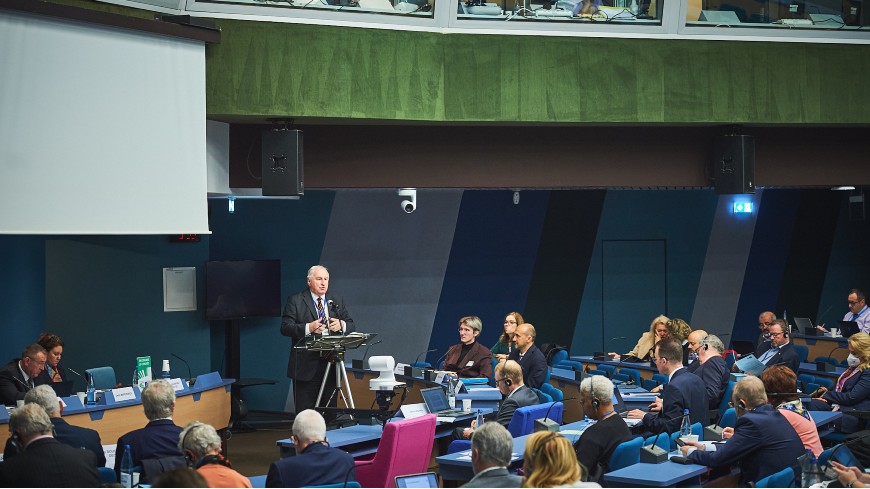While the highly sensitive issue of regional identities sometimes gives rise to passionate or even conflicting polemics, the enhancement of these identities can, on the contrary, become an asset for the regions, as long as it is done in a spirit of respect for dialogue and diversity. This is the conclusion of a report on "Regional identities: promoting dialogue and diversity in unity" presented by Karl-Heinz Lambertz (Belgium, SOC/V/DP) and debated on 26 October by the Chamber of Regions, which adopted a resolution and a recommendation contained in the report. "I know there is no more sensitive subject than the issue of regional identity, but we need to debate it to help regions turn their identity into an asset", said the rapporteur.
This document, adopted by the Congress, aims to help the regions to develop their own identity, but from a perspective of openness towards their neighbours, and not of withdrawal into themselves. The report proposes a "toolbox" of mechanisms to "ensure diversity and manage tensions peacefully". "Within regions, as within each of us, there is not one identity, but multiple identities, often based on emotions and memory", stressed Mr Lambertz, before recalling that European identity itself, far from being imposed in a single way on citizens or regions, is itself the fruit of the recognition of the diversity of identities that make it up. However, these identities are sometimes experienced or presented as an "opposition" to neighbouring regions or to the states of which they are part, whereas they could, on the contrary, promote exchanges, dialogue and mutual understanding. His report addresses the notion of identity in many European regions and shows how to improve the dialogue around regional identities, both within regions themselves, between neighbouring regions, and between regions and central governments.
Providing regions with legitimate representatives and involving them in the decision-making process, taking into account cultural and linguistic diversity and involving citizens in debates on possible changes to territorial boundaries are the main ways in which the paper argues that regional identities can be harmoniously articulated and tensions prevented. "Based on the experiences gathered throughout Europe, it can be said that the regions that succeed are those that value their specificities while opening up to others," added Mr Lambertz.
Regional identities are also social and economic
German youth delegate Marius Wallstein illustrated the theme of regional identity, drawing on his own experience: "I am 21 years old, and I was born in the former East Germany, more than 10 years after the disappearance of the GDR, but like many people there, even the youngest, I still feel our differences with West Germany, 33 years after reunification. He recalled that although regional identities are social and imaginary constructions, they also include economic realities, such as salaries which, in the former GDR, are still much lower than those in Western Germany. Turning to the importance of institutions representing regional minorities within states, he said that it was not enough to engage in dialogue with them, but that it was essential to integrate them concretely into political processes.
Respect for identity includes regional languages and cultures
During the debate, several members of the Chamber presented the relations between their regions and their neighbours, such as Günther Bergmann (Germany, EPP/CCE) who recalled that North Rhine-Westphalia shares 400 kilometres of border with the Netherlands, and encourages not only the learning of the Dutch language, but also the Westphalian regional dialect. In Serbia, the Vojvodina region has 26 different ethnic groups and six official languages, said Aleksandra Maletic (Serbia, EPP/CCE), arguing that this diversity, which is also enhanced by fair representation in regional institutions, provides the whole country with a real gateway to Europe.
Thomas Andersson (Sweden, ILDG) welcomed the fact that northern Sweden, which had long been Norwegian, had been able to build a positive regional identity integrating its multiple influences, and was now encouraging dialogue with indigenous peoples. Gunn Marit Helgesen (Norway, EPP/CCE), welcomed the quality of the report, but expressed concern about the increasing aggressiveness in political dialogues, arguing for more tolerance and respect: "this document presents tools to calm down the exchanges and to guarantee the expression of each one, that's why it is also important".
Responding to the comments, Karl-Heinz Lambertz noted that all speakers expressed their own emotions when talking about their regional identities: this shows, if any further proof was needed, the complex and multifaceted nature of regional identities. "Regional identities are expressed in harmonious diversity in some countries, but in others, citizens feel stifled by majority identities, and I think that the implementation of the tools advocated by this report will help to change these situations", he concluded.
Report CPR(2022)43-02final
Speech by Karl-Heinz Lambertz ( in French)
Mediabox interview with Karl-Heinz Lambertz
****
43rd Session
Agenda – Web file – Multimedia (Live webcasts, interviews, videos and photo)




